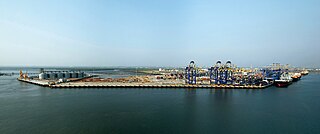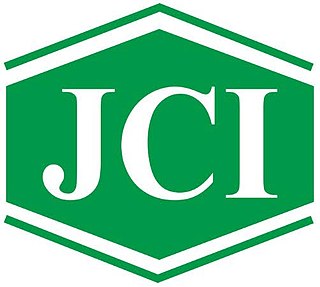Related Research Articles

Jute is a long, rough, shiny bast fibre that can be spun into coarse, strong threads. It is produced from flowering plants in the genus Corchorus, of the mallow family Malvaceae. The primary source of the fiber is Corchorus olitorius, but such fiber is considered inferior to that derived from Corchorus capsularis.

A gunny sack, also known as a gunny shoe, burlap sack, hessian sack or tow sack, is a large sack, traditionally made of burlap formed from jute, hemp, sisal, or other natural fibres, usually in the crude spun form of tow. Modern-day versions of these sacks are often made from synthetic fabrics such as polypropylene.

A coffee bag is a container for shipping and storing coffee. Coffee beans are usually transported in large jute sacks, while coffee sold to consumers may be packaged as beans or ground coffee in a small, sealed plastic bag.

A paper bag is a bag made of paper, usually kraft paper. Paper bags can be made either with virgin or recycled fibres to meet customers' demands. Paper bags are commonly used as shopping carrier bags and for packaging of some consumer goods. They carry a wide range of products from groceries, glass bottles, clothing, books, toiletries, electronics and various other goods and can also function as means of transport in day-to-day activities.

The jute trade is centered mainly around India's West Bengal and Assam, and Bangladesh. The major producing country of jute is India and biggest exporter is Bangladesh, due to their natural fertile soil. Production of jute by India and Bangladesh are respectively 1.968 million ton and 1.349 million metric ton. Bengal jute was exported to South East Asia from the 17th century by the Dutch, French and later by other Europeans.

Hessian, burlap in North America, or crocus in Jamaica and the wider Caribbean, is a woven fabric made of vegetable fibres, usually the skin of the jute plant or sisal leaves. It is generally used for duties of rough handling, such as making sacks employed to ship farm products and to act as covers for sandbags, and for wrapping tree-root balls. However, this dense woven fabric, historically coarse, more recently is being produced in a refined state, known simply as jute, as an eco-friendly material for bags, rugs, and other products.

The Port Muhammad Bin Qasim, or Qasim Port Authority, also known as Port Qasim, is a deep-water seaport in Karachi, Sindh, Pakistan, on the coastline of the Arabian Sea under the administrative control of the Secretary to the Government of Pakistan for Maritime Affairs. It is Pakistan's second busiest port, handling about 35% of the nation's cargo. Port Qasim and Karachi Port, the busiest port of the country, together handle almost 90% of all external trade of Pakistan. The remaining maritime trade is routed through Gwadar Port.
The Trading Corporation of Pakistan (TCP) (Urdu: مشارکتِ پاکستان برائے امورِ تجارت) is a Pakistani state-owned commodity trading company, mainly responsible for export and import of commodities. It also issues tenders for export and import of agricultural products. TCP has its offices across various cities of the country including Karachi, Islamabad, Lahore and Multan.
Ahmed Hussain A. Kazi Tamgha-e-Pakistan Award was a civil servant of Pakistan and senior advocate of the Pakistan Supreme Court, who shaped the internal revenue, economic and industrialization policies during the 1970s.

A reusable shopping bag, sometimes called a bag for life in the UK, is a type of shopping bag which can be reused many times, in contrast to single-use paper or plastic shopping bags. It is often a tote bag made from fabric such as canvas, natural fibres such as jute, woven synthetic fibers, or a thick plastic that is more durable than disposable plastic bags, allowing multiple use. Other shoppers may use a string bag or a wheeled trolley bag. They are often sold in supermarkets and apparel shops.
Adamjee Group of Companies is a group of companies headquartered in Karachi, Pakistan. The group was previously headed by Sir Adamjee Haji Dawood.

Pakistan holds a significant position in the global rice market and is one of the leading rice-producing countries. The rice sector is crucial for the country's economy, providing livelihoods to a substantial portion of the population and contributing substantially to agricultural exports.

The Sealdah–Ranaghat–Gede line connects the Sealdah Main and North terminus of Kolkata with Ranaghat and Gede of Nadia district of West Bengal, India. Once a part of the old Calcutta–Siliguri main line, today it is a busy suburban section of the Kolkata Suburban Railway's Sealdah North section connecting the North 24 Parganas and Nadia districts with Kolkata. It is under the jurisdiction of the Sealdah railway division of the Eastern Railway zone of the Indian Railways.

The Jute Corporation of India Limited (JCI) is central public sector undertaking under the ownership of Ministry of Textiles, Government of India. It is incorporated by the Government Of India in 1971 as a price support agency with a clear mandate for the procurement of raw jute / mesta without any quantitative limit from the growers at the minimum Support price (MSP) declared in each year by the Government Of India based on the recommendations made by Commission for Agricultural Cost & Prices (CACP). This protects the jute growers from exploitations in the hands of the middle men. The basic objective is not profit making but a social cause to protect the interest of about 4.00 million families engaged in farming of jute, most of whom are small / marginal farmers. Therefore, the presence of JCI in the market provide stability in the raw jute prices.
The textile industry is Pakistan's largest manufacturing sector, employing nearly 25 million people. As the eighth largest exporter of textile commodities in Asia, the industry contributes 8.5% to the country's Gross domestic product.

National Jute Manufacturers Corporation Ltd.(NJMC) is a central public sector undertaking under the ownership of the Ministry of Textiles, Government of India. It is headquartered in Kolkata, West Bengal. It was incorporated under the Companies Act, 1956 with an objective to takeover six jute mills, the management of which was earlier taken over by the Government of India under the Industries Act, 1951. At present NJMC is engaged in manufacturing of jute goods through its three running units, two units located at North North 24 Paragnas in West Bengal and one unit located at Katihar in Bihar. It has one subsidiary namely Birds Jute and Export Limited.
Purdue Improved Crop Storage (PICS) bags are bags developed by scientists at Purdue University to store grain and seeds. They use hermetic storage technology to reduce loss of post-harvest cowpea due to orchid infestations in West and Central Africa.
The Bangladesh Jute Mills Association is an association of Jute Mill owners in Bangladesh. This along with the Bangladesh Jute Spinners Association and Bangladesh Jute Goods Exporters' Association represents the interest of the jute industry in Bangladesh. It was established by Samsul Islam in 1982. Abdul Barik Khan is the secretary of the association.
The jute industry is a historically and culturally important industry in Bangladesh dating back to during the growth of the East India Company in the Indian subcontinent. Despite once being one of the country's biggest industries and major export items, the jute industry has declined since the 1970s. Exports have fallen as other countries grow jute independently, decreasing the demand for jute to be exported, and other products like plastics and hemp find more widespread use.

Feed sack dresses, flour sack dresses, or feedsack dresses were a common article of clothing in rural US and Canadian communities from the late 19th century through the mid 20th century. They were made at home, usually by women, using the cotton sacks in which flour, sugar, animal feed, seeds, and other commodities were packaged, shipped, and sold. They became an iconic part of rural life from the 1920s through the Great Depression, World War II, and post-World War II years.
References
- ↑ "Declining trend of jute production".
- ↑ "Jute industry sounds warning over synthetic bags".
- ↑ "Pakistan Jute Mills Association".
- ↑ "PJMA".
- ↑ "Importance of jute in Pakistan".
- ↑ "Promoting jute sowing can save $100m".
- ↑ "Encouraging farmers: 'Cultivating jute locally could save $100m in imports'". The Express Tribune.